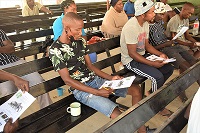
Top-fit rhino rangers to run in challenge to raise funds for wildlife protection

Early in October, four ranger from Save the Rhino Trust (SRT) will show the rest of the world what it takes to be out in the wild, day in day out, tracking rhinos, deterring poachers, and earning an income for them and their families.
Thierry Tjiseua, Jafet Kharuxab, Rudi Kasaona and Erwin Muhongi are the top-fit four-man team that will run 21 km, each with a 25 kg backpack in solidarity with another 50 teams across the continent, to put the role of rangers and the organisations they work for, in the spotlight. The continent-wide event is also a major fundraiser with the ultimate goal of keeping at least 10,000 rangers in the field to continue protecting endangered animals in 70 protected areas covering nearly 2 million square kilometres.
The running rangers are challenged by private donors and members of the public who will run or walk 5, 10 or 21 km distances, log their time, and make a donation via the wildlife rangers challenge website.
A further means of bolstering the fundraising, comes from the Scheinberg Relief Fund that will match the donations dollar for dollar.
The idea for a continent-wide rangers challenge originated from discussions between Jonathan Baillie, a global leader in conservation biology, and Mark Scheinberg, a businessman and philanthropist with a keen interest in conservation and animal welfare. Mark was concerned with the devastating effect that lockdowns were having on the livelihoods of wildlife rangers throughout Africa and the animals they were responsible for protecting. After consulting with strategic partners, they created this exciting campaign and fundraiser – The Wildlife Ranger Challenge – to restore thousands of ranger jobs, support communities and protect wildlife.
Save the Rhino Trust with its 30-year track record of efficient wildlife protection was one of the first organisations to be approached for the rangers challenge. Their endorsement of and participation in the project have helped to secure them emergency relief funding to keep their rangers in the field, to continue protecting Africa’s last truly wild rhino population.
The trust has received first-phase emergency funding after demonstrating extraordinary need and the impact they have both on conservation and on the communities on whose land the rhinos roam.
The project is organised and administered by the respected international conservation charity, Tusk. The charity’s Royal Patron, HRH Prince William, The Duke of Cambridge said; “It is more important than ever that rangers across Africa have the support they need to carry on their vital work. I am therefore delighted that this new Ranger Fund will help the protected areas that need it the most and keep rangers deployed in the field.”
As a result of the devastating and ongoing economic impact of the lockdowns, rangers across Africa have had their salaries significantly cut, and many have been furloughed – leaving families without income and wildlife vulnerable and unprotected. With many rangers stretched to capacity and international and national borders re-opening, it is feared that protected areas across Africa will experience a rapid increase in wildlife crime as well as a decline in wellbeing and economic security for the communities to whom this wildlife belongs.

Thierry Tjiseua, Jafet Kharuxab, Rudi Kasaona and Erwin Muhongi.












































